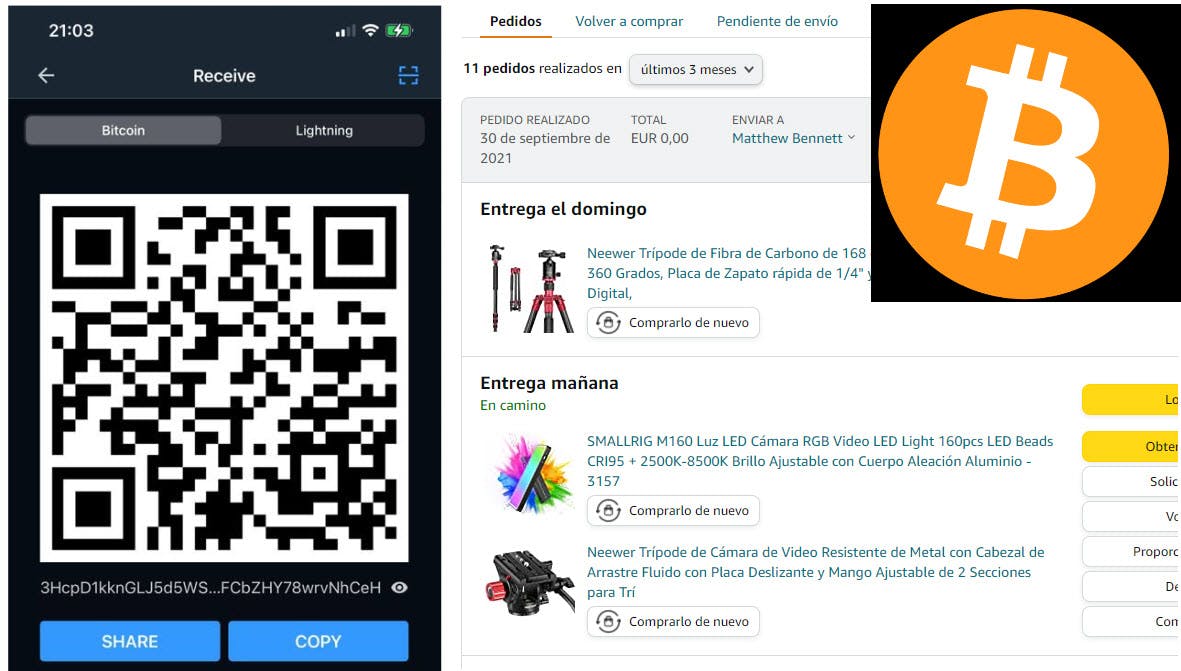Guaranteeing independent journalism...with Bitcoin
October 12th, 2021

- Let's see if I can explain this without getting lost in the technicalities of bitcoin, about which I understood almost nothing until this week. It was on a mental list of global issues I would one day understand better.
- Not going to get into the huge systemic economic, social and political debates around bitcoin today, which will be fascinating to watch and report on over the next few years.
- A week ago, Twitter announced it was introducing "tips" on people's profiles and that one of the options was going to be...bitcoin, with two bitcoin options: standard bitcoin and something called lightning bitcoin.
- For standard bitcoin, Twitter lets you put a bitcoin "address" in a new profile field. To "tip" someone (send them some bitcoin, or bits of bitcoin, called "satoshis"), you copy and paste that address into your bitcoin "wallet" (but the easiest thing seems to be to scan a QR code on your phone)
- There are several possibilities for a bitcoin "wallet". I installed an app on the phone called Muun. Why? Because Twitter boss @jack recommended it in a tweet. So it's probably not a terrible one.
- Another Jack, the boss of Strike, also mentioned Muun in his new video talking about the Twitter-Strike lightning bitcoin option, which so far is only available in the US and El Salvador.
- Why El Salvador? Because El Salvador has introduced bitcoin for everyone in the whole country, a new national payment system. The lightning version is about making bitcoin faster and the transactions cheaper.
- The lightning bitcoin thing on Twitter seems to be about Srike using bitcoin to let people send dollars or euros to each other. But if you don't live in the US or El Salvador, you don't need to worry about that for now.
- Some readers who understand bitcoin sent me a few bits of bitcoin ("satoshis") to test. It worked (of course it did, but it was new for new). The bits of bitcoin appeared in my "wallet" (the Muun app on my phone), along with a euro equivalent amount.
- So that was fun. The options for receiving bitcoin, for now, seem to be somebody copying pasting the address into their wallet, or me sending them a lightning bitcoin "invoice" first (another line of text or a QR code).
- Then I discovered a site called, @bitrefill, which promised to turn bitcoins, or bits of bitcoin, into Amazon vouchers that I could spend on journalism stuff. The first little test worked.
- Some other readers sent more satoshis. Quite a few more. One person sent nearly €200 worth, which was very cool, but I know nothing about who they are. Man? Woman? Age? Country? Language? Job? Identity? No idea. Nothing. Zero. Completely anonymous. [Thanks if it was you.]
- Let that sink in. A completely anonymous private reader decided to send along some virtual money to guarantee more and better public journalism for all, in the physical world, with a journalist you can recognise.
- Amazon tells me that the second batch of reporting objects bought with bitcoins from readers who have guaranteed this journalism is already on the way. For now, some cables, connectors, a light and a cage for the phone for the new live streams, a better tripod to hold it all up.
- But those new objects will actually really improve things next week when I go and do a first real mobile live stream for you (there will be a big environmental march in Murcia on Thursday because of all the dead fish in the Mar Menor).
- So now we have another cool option for guaranteeing independent journalism. We can talk more about bitcoin another day.
- You will see the bitcoin addresses and QR codes on the bottom of every article, and in the emails, or you can find them on Twitter, as well as some other alternatives.
- Also, as you can see, we're going in a little bit of a different strategic direction with the journalism-funding model over the next few weeks and months. Same basic idea but more options, more distributed. Time to move up another level: more reporting, more photos and video and audio, more reporting trips around Spain. Will explain more in future posts.
- Fascinating coincidence that this happened the same week I went up to Alicante to speak at the national transparency congress. Thanks for reading. 100% readers = independent journalism.
Guarantee independent reporting (BTC, ETH, DOGE): thespainreport.wallet
Subscribe to Matthew Bennett
Receive the latest updates directly to your inbox.
Verification
This entry has been permanently stored onchain and signed by its creator.
Arweave Transaction
wRVLuuvK1xNxBLG…IXeAWG3fFFuK96U
Author Address
0xF02EEfC88336c14…b6Fc24539357871
Content Digest
kXERdsG7715ahu5…0OjlrVjAvIY3S3g